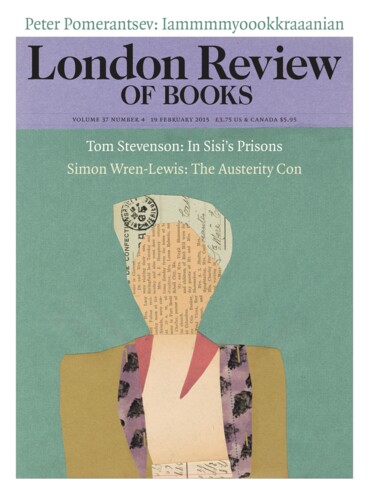One of the problems with Ukraine is that no one really knows where it is. For many people, not least Vladimir Putin, it’s an extension of neo-tsarist Russia. For others it’s a Central European state of frustrated blood-and-language nationalism which just needs the chance to build strong institutions to express its essence. The Nestor Group, a collection of Ukrainian thinktanks and intellectuals, has meanwhile concluded that Ukrainian value systems reject both the Russian model (deification of paternalistic authority) and the language-and-bureaucracy-makes-a-state logic of Central Europe. Instead, Ukrainians lean towards horizontal civil society bonds: the 'sotni' who made up the revolution on the Maidan, the volunteers who fund and feed the army, church congregations and small business associations, criminal gangs and football hooligans. According to Yevhen Hlibovitsky, a member of the Nestor Group who was involved in both the Orange Revolution in 2004 and Maidan in 2014, this puts Ukraine in the same bracket as Mediterranean countries such as Italy or Greece.
Peter Pomerantsev
Peter Pomerantsev’s latest book, This Is Not Propaganda, won the 2020 Gordon Burn Prize.
On 14 January 2014 I saw Jack Straw speak at the Westminster Russia Forum at the Baltic Restaurant on Blackfriars. The Forum, formerly known as Conservative Friends of Russia, was launched in August 2012. Leaked e-mails from Russian officials soon appeared, saying they had been urged to use the organisation to campaign against the Magnitsky Act in Westminster. CFoR tweeted photographs of the anti-Kremlin head of the Parliamentary Committee on Russia, Chris Bryant, in his underpants. The Russian diplomat liaising with the group was Sergey Nalobin, first secretary in the embassy's political section (his father was a senior figure in the KGB and FSB). They were accused by the Guardian, World Affairs and Private Eye of being a lobby group for the Kremlin.
Diary: Iammmmyookkraaanian
Peter Pomerantsev, 19 February 2015
When I was growing up in the 20th century revolutions seemed significant. At school the Russian Revolution was everyone’s favourite subject but it was less theoretical for me than for most: my parents had ended up in England because of it. The 68-er parents of schoolfriends would tell me about the sexual and cultural revolutions of their youth which, they said, changed the world. I was 12 in 1989, when we all watched the Berlin Wall fall on live TV. It seemed like the Russian Revolution and the 1960s rolled into one.
If Scotland votes ‘Yes’ to independence, Scots and English will both lose a country, Great Britain, but also gain a new one. I will lose one, but what will I gain? As a first-generation immigrant I can be British but never English (or Scottish or Welsh or Irish). It would be the second time I’ve lost a country. The first was the USSR. I don’t regret its demise but I’m still perturbed by airport visa forms that ask where I was born. I want to write USSR but am told to write Ukraine. Why wipe out history?
Over a drink, an English investment fund manager working in Moscow told a friend of mine that the war in Ukraine meant everyone in his office had had to ‘downgrade their own futures’. They had been calculating that Putin would eventually calm down and things would get back to normal. He hasn’t, and it looks like nothing will ever be normal again. At the fund manager’s office, they’re talking about the possibility of 30 per cent inflation and GDP contracting by 10 per cent. Some of them have decided to relax and enjoy the apocalypse. Since the Kremlin banned food imports from the EU and US earlier this month, there's a sense of needing to party before the good things run out. They start drinking on Tuesdays now.
Podcasts & Videos
Peter Pomerantsev, Marina Hyde and Carl Miller: This is Not Propaganda
Peter Pomerantsev
Peter Pomerantsev’s latest book, This is Not Propaganda, travels the world to investigate why we can no longer believe what we say, or say what we believe. He talks about here with Marina Hyde and Carl...
Diary: European Schools
Peter Pomerantsev
Peter Pomerantsev reads his diary about his time in the 'English section' at the European School in Munich.
Diary: Iammmmyookkraaanian
Peter Pomerantsev
Peter Pomerantsev reads his piece on the images and myths of Maidan.
Read anywhere with the London Review of Books app, available now from the App Store for Apple devices, Google Play for Android devices and Amazon for your Kindle Fire.
Sign up to our newsletter
For highlights from the latest issue, our archive and the blog, as well as news, events and exclusive promotions.


